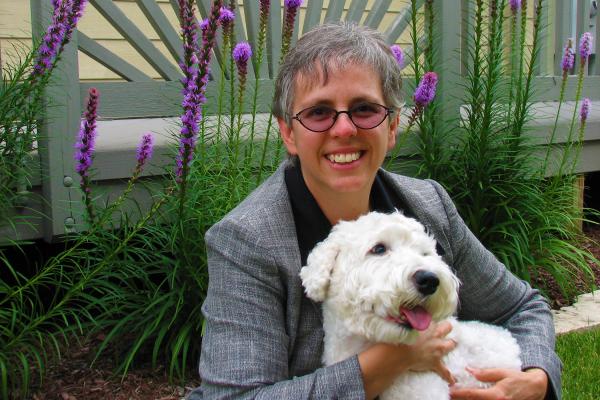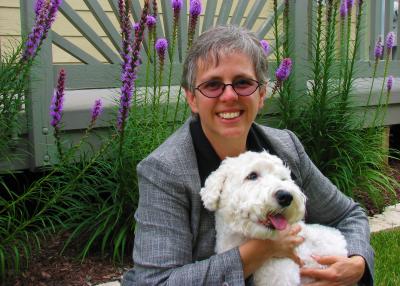A Conversation with Marla Berkowitz, ASL Senior Lecturer

First, a little background about you, where did you grow up? What were some of the defining characteristics of your youth? What were your interests?

I'm a native New Yorker who grew up on Long Island. Before I moved to Columbus, I lived in Manhattan for more than fifteen years.
Growing up I lived as "passing as a hearing-identified person" who was taught the English language through speech training. Upon discovery of ASL and the DEAF-WORLD, the ease of conversations changed my life. Nowadays, I'm a Sumain; “a coined word from two languages - Su - your; main - hands which as a group connect with each other using our hands."
I'm a cultured, conscientious, and a social activist who loves traveling, studying languages (French, British Sign Language, Israeli Sign Language), living in different countries (France and Israel) and enjoy doing trainings, advocacy, hiking and reading books.
What got you into American Sign Language?
I first learned fingerspelling from my mother who was taught by teachers at the Lexington School for the Deaf in Queens, NY where I was a student for three years as a young child. At that time, I learned ASL from my deaf classmates who came from deaf families.
At age fifteen, I met many deaf young people at a deaf teen club on Long Island who grew up in deaf families that used ASL and re-learned it from them. Ever since then, I started using it on weekends, which later turned to daily and now, I use it as my primary preferred language usage.
I understand you have two Masters Degrees, where did you get them from, what was your focus?
My first MA was from New York University where I studied how to empower deaf people from all walks of life, while simultaneously working for an agency founded by Deaf Jews, back then called New York Society for the Deaf. At that time, I worked with deaf people who were living with HIV/AIDS and/or died of this illness. This career inspired me to go back to school to study my Jewish roots at the Jewish Theological Seminary where I obtained a master’s degree in Jewish Studies.
Now a little bit about your book, what prompted you to write a book, "Deaf and Hearing Siblings in Conversation," about the deaf and hearing dynamics of adult sibling relationships? How long did it take you to conduct/compile your research?
As anyone would do when studying their own family history, they’d want to know more about themselves. So, I've searched for years for a book about deaf siblings. Upon meeting with Judy Jonas, co-author of this book, we shared our sibling stories which led us to do a research study on the dynamics of adult deaf and hearing sibling relationships. Scholarly studies on siblings have traditionally been from the perspective of the sibling's experiences impacted by their sibling who has the disability, which isn't the whole story. Our book, based on face to face interviews with deaf and hearing siblings of the same family, is the first ever to show perspectives from both deaf and hearing siblings which we believe is unique and well-balanced. In addition, Judy and I included our personal experiences as well of our own siblings’ perspectives.
It took Judy and me twelve years from doing interviews with the ten families, which consisted of 10 deaf and 12 hearing siblings, to getting the book published, especially when our style of working as a team requires us using video technology and google docs software to communicate in ASL and do the writing when living in two different states.
What’s the greatest takeaway you hope readers get from this book? What is the most important thing you took away from the researching and writing of this book?
The greatest takeaways I hope for our readers to get from this book is to be the spark for ongoing conversations with their adult siblings. For parents raising deaf and hearing children, to have the entire family unit use ASL as soon as they’ve identified their child as being deaf, and for professionals who encounter deaf people to use ASL in their work as a means of respecting a linguistic cultural group that co-exists in our American society.
In addition, using ASL as a legitimate language is the foundation of building sustainable relationships in spaces where deaf and hearing people interact, most especially in families. Recognizing and acceptance of your siblings for who they are, even when they are living their lives completely different from yours, is unconditional love. Investing quality time, even at distance, with your sibling is the greatest gift of emotional support you get since sibling relationships last longer than any other relationships.
***
Join us for a special reading and book signing on Wednesday, January 21st at 4pm in the Crane Café in Hagerty Hall.
Books will be available for purchase and coffee, tea and cookies will be served. Interpreting services will be provided. For more info, please email Tia Jones at jones.2246@osu.edu.

